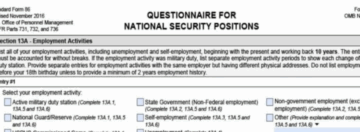Spouse’s Failure to Pay Taxes is No Excuse

I have seen it time and again where security clearance applicants who are denied eligibility based on financial issues claim the reason for the delinquent debts is because the spouse was in charge of the finances, and they thought all the bills and taxes were being taken care of. A recent Defense Office of Hearing and Appeals case highlighted the fact that this excuse does not hold water when it comes to getting a security clearance. Here is a summary of the appeal:
The applicant’s spouse owns a construction business, which the applicant helped run. The spouse handled all the finances and taxes for the business and filed their joint tax returns every year. The Internal Revenue Service (IRS) transcripts showed the applicant and her spouse owed over $32,000 for tax years 2020 through 2022. They filed late for tax year 2023 and ended up owing $9,236. They also owed over $10,000 in state taxes. In March 2021 they sold their house for $400,000 and used the proceeds to pay off delinquent credit cards and the rest to build a new home. No money was put toward the taxes owed.
During her interview with the background investigator, she stated her spouse would make arrangements to make them current on their taxes. He did set up a payment arrangement with the IRS but made only one payment. The IRS notified them the arrangement was defaulted due to lack of payments. The applicant was denied eligibility by the DoD based on these concerns. In her appeal she wrote “whatever determination has been made about my character based on owed taxes from my husband’s income (which we have a payment plan for) is an insult to me and my family”.
The DOHA judge who reviewed her written appeal opined that their stated intent to pay their taxes in the future is not a substitute for a proven track record of resolving the debts, and that she did not act responsibly in making a good-faith effort to ensure the taxes were being paid. Her name was on all the jointly filed tax returns, therefore, she is also responsible for them. The clearance denial was upheld.



This was just one of several reasons why I began filing my taxes “married but filing separate” 10 years ago and divorced spouse 5 years ago.
Now-former spouse had set up payments, but I ended up making the bulk of those payments. Took me many years and a lot of documentation filed each year, but I held on to my clearance.